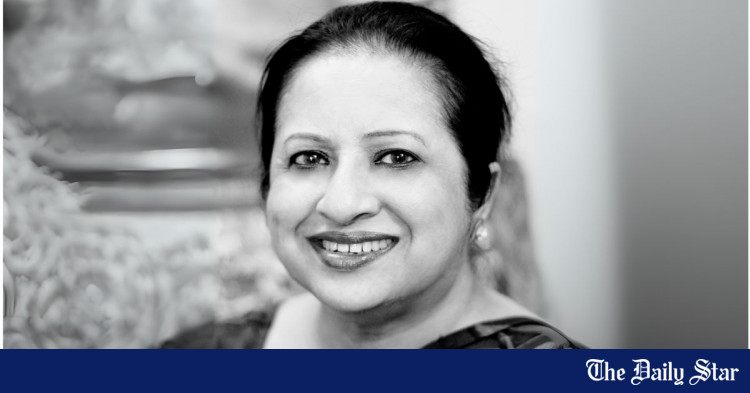Honoring Sigma Huda: A Trailblazer for Women’s Rights
Each year, global civil society amplifies the conversation around violence against women and girls during the 16 Days of Activism against Gender-Based Violence campaign, beginning on November 25. This year, as many focus on the long road ahead toward achieving gender equality, it’s important to take a moment to reflect on the pioneers who have paved the way: one such figure being Sigma Huda. On July 17, 2024, amid an unprecedented political upheaval in Bangladesh, the nation mourned the loss of one of its most fervent champions for women’s rights and gender equality.
As one of the most prominent female lawyers in the country, practicing since before the nation’s independence, Sigma Huda not only shattered the glass ceiling but ensured it wouldn’t be put back together. Her journey began when she became the first woman to enroll in a law degree program at the University of Peshawar, at a time where women faced significant barriers to entering the field of law. She also co-founded one of Bangladesh’s oldest law firms, marking a historic achievement in a male-dominated profession.
Beyond her legal practice, Huda founded multiple NGOs dedicated to advancing women’s rights in Bangladesh. Notable among these is the Bangladesh National Woman Lawyers Association (BNWLA), the first NGO composed entirely of women lawyers, designed to encourage female participation in the legal profession and combat gender inequality. She established the Acid Survivors Foundation, the first NGO dedicated to addressing the plight of acid attack victims, and worked tirelessly to support pregnant and abandoned women through initiatives like the Association for the Prevention of Septic Abortion, Bangladesh (BAPSA) and the Bangladesh Breastfeeding Foundation. Furthermore, she presided over the Center for the Training and Rehabilitation of Destitute Women, now known as the Home for Destitute Women and Children.
Huda was also a trailblazer within the legal community. In 1971, she became the first woman partner in a law firm, Chancery Chambers, which went on to become one of the leading firms in Bangladesh. Her influence extended to significant leadership roles within key legal organizations, including the Supreme Court Bar Association and the Bangladesh Bar Council. Furthermore, she served on the Bangladesh Labour Law Reform Commission and held the position of regional vice-president for the International Federation of Women Lawyers (FIDA).
Representing Bangladesh at the United Nations General Assembly in 1978 was yet another feather in Huda’s cap, where she worked on drafting the Convention on the Elimination of All Forms of Discrimination against Women (CEDAW). Her advocacy played a crucial role in mobilizing the feminist movement in Bangladesh, pressing for the state’s ratification of CEDAW.
In 2004, she made history again as the UN’s first special rapporteur on human trafficking, producing technical reports and setting standards globally to combat the trafficking of women and children. Her impactful 2006 report highlighted critical issues in the legal and institutional approaches to women in prostitution and underscored how demand contributes to sexual trafficking. This further led to her appointment to the National Council for Women’s Development, and she remained a crucial member of the Coalition against Trafficking in Women – Asia Pacific.
Huda was also among the first to address the issue of marital rape in Bangladesh, challenging the misinterpretation of religious laws that justified domestic violence. In July 1985, The New York Times featured her among three remarkable women at the UN’s Third World Conference on Women in Nairobi. Even as recent as 2020, her efforts took on renewed relevance when societal backlashes surfaced, highlighting the ongoing struggle for women’s rights in the country.
Her impact was not limited to advocacy alone—she led the first case in Bangladesh where a mother was granted sole guardianship of her child in 1982, setting a landmark precedent for women’s rights within divorce proceedings. Huda’s commitment to public interest litigation resulted in vital legal victories for marginalized groups, including a significant Supreme Court ruling in 1999 that protected the rights of women in prostitution against illegal eviction.
The legacy of Sigma Huda is a testament to her unwavering dedication to women’s empowerment and social justice. Her activism was a pioneering force in a time when public outcry for women’s rights faced extreme backlash. She operated in an era without the support of social media or instant public validation, yet her resilience in the face of adversity has paved the way for future generations of activists to continue the fight for justice.
Although she may no longer be with us, Sigma Huda’s remarkable contributions to the empowerment of women resonate through our society, inspiring today’s and tomorrow’s advocates to pursue justice and equality with the same fervor she displayed throughout her life.
The views expressed in this article are those of the author alone.
For the latest opinions, commentaries, and analyses by experts and professionals, follow daily updates in relevant forums.


